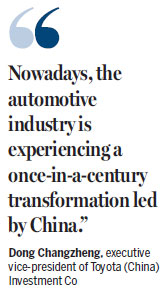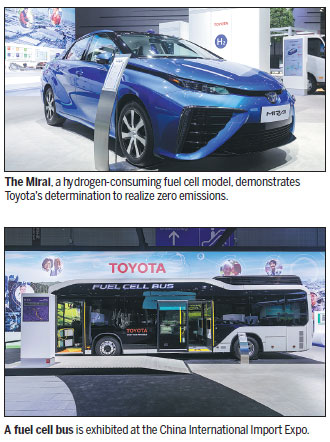Japanese carmaker ups pace of electrified, connected strategy
Toyota Motor Corporation said it is stepping up its pace to introduce electrified and connected vehicles into China, as part of its long-standing commitment to the world's largest automotive market.
The Japan-based global carmaker is planning to introduce 10 new electrified models into China by 2020 and localize core parts including electric motors and batteries. An extension to its battery laboratory in Changshu, Jiangsu province, is to be finished in 2019.
Toyota said it will start to sell battery electric vehicles - C-HR and Izoa models - in China in 2020, ahead of its other markets. It will offer plug-in hybrids - Corolla and Levin - developed with considerations of Chinese customers from early 2019.
Some hybrid models, including the Corolla and Levin sedans, have been in the Chinese market for a while, and, according to the carmaker, development on their plug-in hybrid versions is going smoothly.

In terms of hydrogen-consuming fuel cell models, Toyota has been conducting a three-year verification test of the Mirai passenger car since 2017, and it has built hydrogen gas stations in Changshu.
The carmaker said it is also exploring opportunities in developing smart and connected vehicles with Chinese companies.
Didi Chuxing, China's ride-hailing giant, has become a partner of Toyota's e-Palette Alliance. The e-Palette is an electric, smart and autonomous concept vehicle unveiled at the Consumer Electronics Show in Las Vegas earlier this year.
"Nowadays, the automotive industry is experiencing a once-in-a-century transformation led by China, one of the fastest-developing countries in the world," said Dong Changzheng, executive vice-president of Toyota (China) Investment Co.
"China has been leading the world in terms of fundamental technologies, infrastructure and testing conditions, and we will keep up with the times and make all efforts in research and development to match the pace of China," Dong said.
The moves are expected to further boost Toyota's long-term success story in the country.
The carmaker forged its relationship with China when it started to export its Crown sedans in 1964, and has since gradually expanded its presence in the country.
Over the years, it has built two car-producing joint ventures, FAW-Toyota and GAC Toyota, and the accumulated sales of vehicles under Toyota and its premium brand Lexus have topped 10 million in China.
In 2017, Toyota delivered 1.29 million vehicles to Chinese customers through its network of 1,400 dealerships, and this year the company is on the path to sell 1.4 million.
"Toyota is committed to the principle of 'customer first, dealer second and carmaker third'. We do not overstress sales. Instead, we pursue to offer safe, reliable and high-quality products and services to our customers," said Kazuhiro Kobayashi, Toyota Motor's senior managing officer and CEO of Toyota Motor's China Region.
Kobayashi, also chairman and president of Toyota (China) Investment Co, said Toyota has built a complete lineup in China, covering sedans, SUVs and MPVs. He expects Toyota to open a new chapter in the country as models developed under the new platform, called the Toyota New Global Architecture, are hitting the market.
According to the carmaker, the architecture is developed with the aim to build ever better vehicles on common platforms with common parts, and it is designed to make its manufacturing plants more flexible and responsive to changes in the marketplace.
Kobayashi said Toyota's research and development facility in China is working on models that will better meet demands of local customers and road conditions, and is accelerating local production of technologies including smart and connected vehicles.
Toyota has been making and continues to make corporate social responsibility an important pillar of its development strategy in China.
For example, it has spent 42 million yuan ($6.07 million) on organizing a tree planting program for 18 years in a row in Fengning county in Hebei province. So far, more than 5 million saplings have been planted.
Toyota has offered a bonus of up to 36 million yuan over the past 12 years to sponsor environmental protection initiatives, benefiting 150 teams and individuals.
In terms of traffic safety, it has organized experiential events in big cities including Shanghai, Beijing, Tianjin and Chengdu for the past decade.
The carmaker has also helped to train around 33,000 mechanics in China since 1990, with the expenditure involved reaching 130 million yuan.

(China Daily 11/08/2018 page9)














